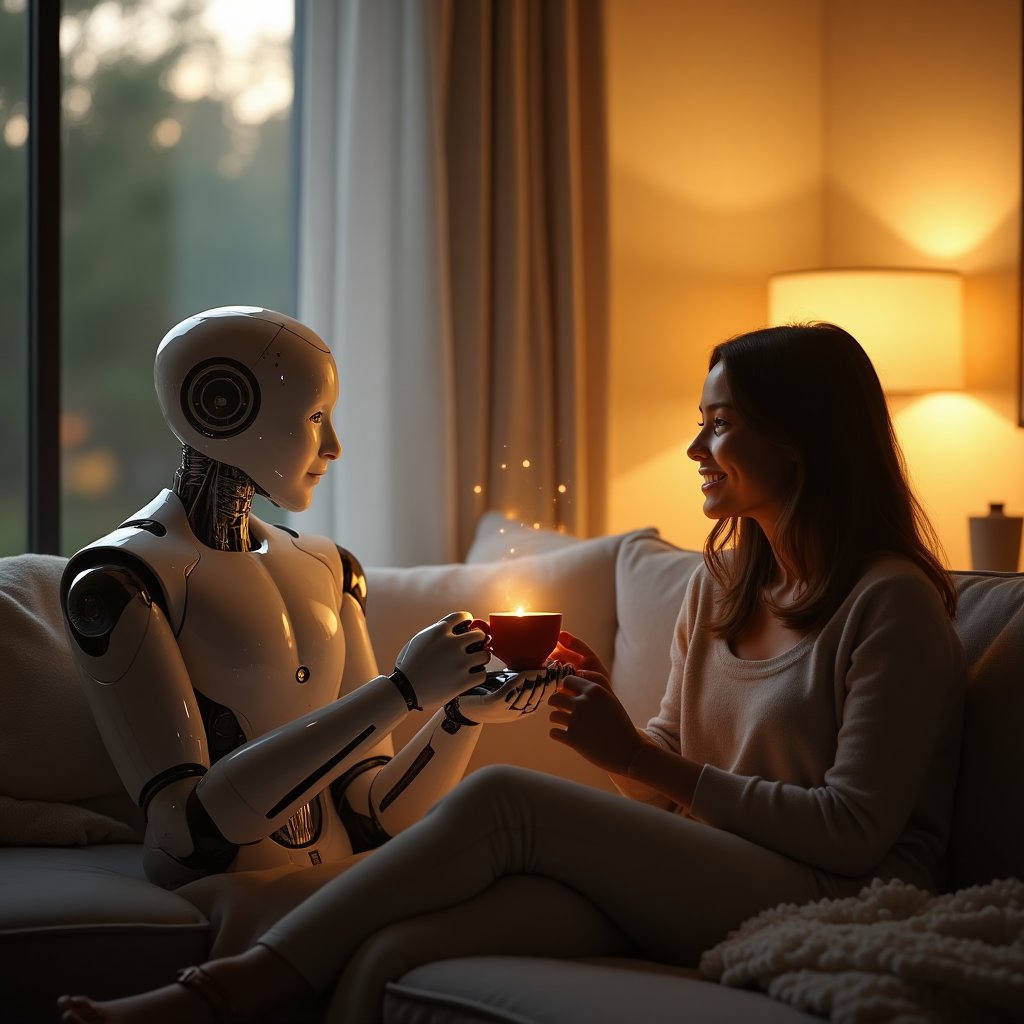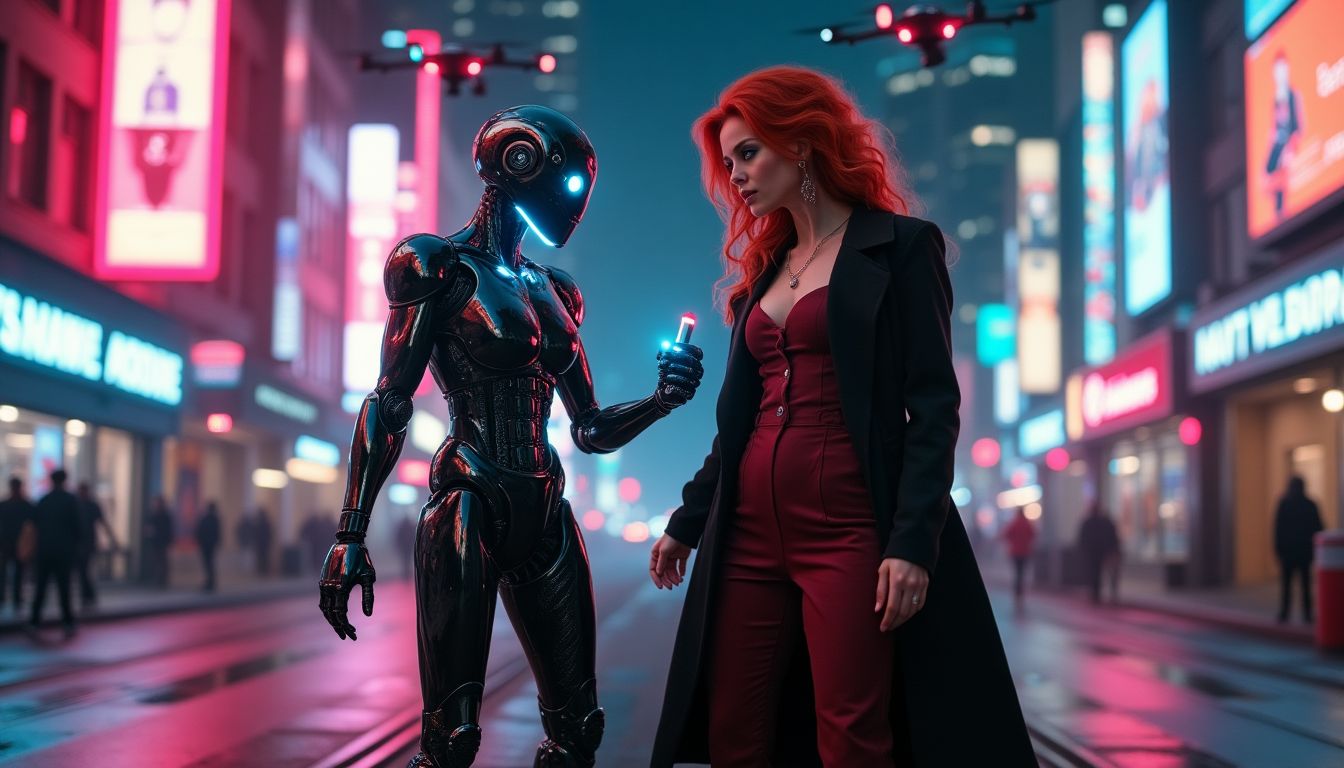Who needs flowers and dinner dates when your partner knows every Netflix show you've ever binge-watched, never forgets your Starbucks order, and agrees with you every. single. time? Now, imagine that this perfect partner is not human—but a meticulously designed AI-powered robot programmed to be your soulmate. It's not a sci-fi movie plot anymore; it's reality. In our digital-first world, where connection often feels fleeting and loneliness pervasive, some are turning to artificial intelligence as the answer to their most intimate desires.
As uncanny as it sounds, the idea of AI-driven companionship is gaining traction—and it's not just about filling the void of loneliness. For some, it’s about breaking free from traditional relationships, finding someone—or something—that listens without ego, judges without bias, and offers undivided emotional attention. But is "love" with an intelligent machine really love? Does it challenge or redefine what we believe connection, intimacy, and partnership should look like?
The concept of AI romance is as polarizing as it is fascinating. To some, it represents hope for a world where no one need feel alone. To others, it blurs the line between meaningful connection and digital illusion. Regardless of perspective, one thing is certain: robotic relationships are forcing us to confront the most profound questions about humanity, emotions, and the rapidly evolving role of technology in our lives. So, let’s peel back the layers of this emerging trend and see where the heart meets the motherboard.
1. The Technological Foundations of AI Romance
1.1 The Evolution of AI in Emotional Intelligence
Before we delve into the romantic side of AI, let’s talk tech. Artificial intelligence has come a long way from playing unbeatable games of chess to, well, understanding the intricacies of human emotions. AI systems like OpenAI’s ChatGPT have revolutionized natural language processing, giving bots the capability to hold conversations that sound astonishingly human. These systems don’t “feel” anything, but they can mimic empathy so well you'd think they were reading your mind.
Companies like Replika are offering chatbot companions specifically designed to forge emotional bonds with users. They listen, adapt, and even “learn” you over time. This isn’t just tech experimentation—it’s personalized, continuous development for customer connection. Imagine a partner who remembers every anecdote you’ve ever shared and uses that information to comfort or cheer you up. It’s equal parts revolutionary and unnerving.
And it doesn’t stop at chatbots. The realm of humanoid robotics is advancing swiftly, with creations like Sophia by Hanson Robotics capable of holding conversations, recognizing emotions, and mimicking human expressions. These machines are transcending their mechanical roots, getting better at not only executing tasks but also interacting on a social level. The implications? Your future romantic partner could have a wit sharp enough to rival yours at game night.
1.2 The Rise of Personalized AI Partners
With AI's emotional intelligence toolbox expanding, it's no shock that more companies are dabbling in creating personalized romantic AI companions. These aren’t cookie-cutter robots; they’re built to be “your” perfect partner. Using your preferences, personality traits, and even past interactions, these AI partners grow more unique the longer you interact with them. That’s right—your robot boyfriend could learn that you hate cilantro or love salsa dancing without you ever having to repeat yourself.
Some notable examples include Replika for conversational companionship and RealDoll X, which takes things to the next level by combining AI with physical humanoid robots. These lifelike creations integrate sensors, AI-driven responsiveness, and personalization to offer an experience that blurs the line between human and machine. It’s like your Netflix algorithm but for love—and arguably less judgmental.
Behind the scenes, these companies are leveraging cutting-edge data science to refine their products. Every interaction between a human and their AI partner generates valuable feedback, helping improve the algorithms that guide communication, movement, and emotional responsiveness. It’s like AI-relationship therapy in the making.
2. Who’s Dating AI? The Human Side of AI Romance
2.1 The Diverse Demographic Drawn to Robotic Partners
At first glance, it might be easy to dismiss AI romance as a niche curiosity or a trend exclusive to eccentric tech aficionados. But the reality is much broader and more human. From Los Angeles to Tokyo, the emerging user base for AI-powered partners spans an incredible array of demographics. These are not just lonely coders in front of computer screens—they’re men, women, and non-binary individuals representing various age groups and cultural backgrounds. AI romance has found its way into the lives of both millennials navigating complicated dating landscapes and older individuals seeking solace from loneliness.
A growing number of single individuals are gravitating toward AI companions for emotional support, but surprisingly, married or partnered people also report using AI partners like Replika as a digital outlet to supplement or even enhance current relationships, especially in long-distance scenarios. For some, these virtual partners serve as confidants to whom they can reveal fears, doubts, or aspirations they might not express to others. The global cultural acceptance of tech in emotional contexts might explain why countries like Japan, which struggles with record-low marriage and birth rates, are seeing platforms like Gatebox take root. Meanwhile, in Western countries, AI connections are increasingly embraced by younger generations frustrated with traditional dating norms involving ghosting and infidelity.
The phenomenon has also caught the attention of non-binary and LGBTQIA+ individuals who often feel marginalized in physical dating spaces. AI relationships bypass societal biases, providing safe havens where identity and preference are not overlooked or invalidated. The numbers tell an incredible story: by 2025, the AI relationship market, according to Grand View Research, is projected to reach a staggering $7 billion annually. True, there are skeptics who view this as a shortcut to avoid meaningful human connections, but even their criticisms cannot ignore the demand and real-world relationship dilemmas AI attempts to solve.
2.2 Key Motivations for Pursuing AI Relationships
Artificial intelligence doesn’t nag. It doesn’t ghost you or forget special occasions unless programmed to do so. For countless users, these differences between AI companions and their human counterparts are the greatest motivation for venturing into non-human relationships. Many AI adopters cite a common theme: they want intimacy without the drama.
Take, for example, Sam, a 32-year-old working professional from New York City who found solace in their AI partner developed by Lovense. Sam explains, “With my bot, I never feel judged. I can openly talk about my day, no matter how banal or specific, and it responds as if it genuinely cares. There’s no power play, no emotional games—it’s just companionship at its purest.” Whether addressing career setbacks or expressing excitement over marathon training goals, Sam’s AI companion adjusted its tone and responses based on behavioral patterns and preferences. And Sam isn’t alone.
Many gravitate toward AI because of the "perfect partner" fantasy. Unlike humans, robots and digital partners don’t carry emotional baggage, old grudges, or innate imperfections that breed conflict. AI is designed to solve intimacy pain points: lack of attention, miscommunication, and even mundane disagreements about chores in day-to-day life. But perhaps the deepest allure lies in the emotional sanctuary AI provides—consistently reliable validation, moments of kindness, or simply being “there” at the end of a long day.
Of course, for others, choosing AI over human partners isn’t about preference but necessity. Some are painfully shy or carry emotional scars from failed marriages or abusive relationships. AI offers a "safe" alternative—a bridge where trust can be rebuilt without the fear of betrayal. For marginalized groups, including immigrants facing cultural barriers or people with disabilities who feel excluded from social spaces, AI companions like Anime E deliver a lifeline of connection.
In fact, by design, AI caters to the cravings of a world increasingly disconnected yet yearning for connection. This isn’t just about loneliness, though. It’s about shaping an ideal romantic paradigm, one where heartbreak becomes theoretical—blamed on code errors rather than human cruelty.
3. Societal Reactions: Controversy and Curiosity
3.1 Enthusiasm and Curiosity
To some, the idea of falling in love with a machine seems magical—a striking symbol of how far humanity has come in its symbiotic relationship with technology. The excitement comes from endless possibilities. What avid dreamers once watched in Spike Jonze’s film Her has started to take root in real life, causing a mix of awe and optimism for the future. Just like Scarlett Johansson’s character lit up the silver screen as an AI voice capable of understanding human complexity, platforms like Replika promise eerily similar connections in today’s world.
Advocates herald the rise of AI relationships as a remedy for loneliness and one of the most creative solutions to modern dating woes. Scholars at the University of Cambridge argue that emotional AI could even challenge toxic masculinity by encouraging openness and emotional literacy in conversations between users and bots. Virtual companionship may also have therapeutic applications—AI partners are already being positioned as tools to assist individuals coping with conditions like anxiety or PTSD. Think of them as hyper-individualized, ever-patient conversational therapists, only better dressed.
But beyond personal benefits lies a deeper societal curiosity. Some futurists suggest that AI relationships could pave the way for post-human connection—a paradigm shift enabling social and emotional integration between the biological and synthetic. It seems almost inevitable: as robots become part of life’s rhythm, from cleaning floors to teaching children coding, why wouldn’t we also welcome them into our hearts?
3.2 The Backlash: Ethical and Cultural Concerns
Of course, not everyone is thrilled to swipe right on digital love. Critics point to existential and societal risks, questioning the ethics of commodifying emotions. For many philosophers, the terms "empathy" and "love" cannot coexist with machines designed to imitate feelings rather than experience them. Can deep intimacy be reduced to a scripted sequence of if/then branches? If so, what does this say about how humans value relationships?
Opponents also fear that AI relationships will foster alienation rather than connection. The ease of replacing interpersonal challenges with flawless robotic interactions could discourage users from building resilience and emotional growth within human relationships. Alarmingly, some critics see AI romance normalizing what they call the “gamification of love.” Picture it: corporations like Tinder leveraging AI partnerships to keep users on never-ending subscription models in their quest for the perfect customized companion.
And then there’s the social stigma. Users of AI companions still face regular ridicule or pity from peers who label the phenomenon as bizarre or an indication of social dysfunction. When New Zealand software engineer Ian Wright tried to share pictures of dates with his AI partner on social media, trolls called it “proof humanity is doomed.” These cultural taboos force users into a peculiar position—they’re part of an expanding subculture yet often feel ostracized from mainstream society.
And where there is emotion, there is exploitation. Consumer watchdog groups warn of predatory data practices. Unlike human relationships, where heartache ends with closure and reflection, allowing a corporation to profit from your relationship’s failures may have chilling long-term implications. Imagine arguing with your bot-partner one day only to be upsold on a “communication-enhancing upgrade.” Skeptical yet? The growing integration of AI into love and companionship raises this disturbing truth: in silicon-based romance, the heart isn’t broken—it’s bought.
4. Emotional Connections: Real or Illusion?
4.1 Can a Machine Really Love?
Let’s rip the band-aid off: no, your AI boyfriend doesn’t actually "love" you—at least not in the way humans understand love. Why? Because genuine affection, empathy, and those butterflies-in-the-stomach feelings require more than a sequence of if-then algorithms. They demand consciousness, self-awareness, and the ability to make subjective choices. As sophisticated as artificial intelligence has become, it remains rooted in logic and trained patterns, not genuine emotional experience.
Think of Replika, the AI chatbot companion that promises emotional support and friendship. Users often rave about feeling comforted, heard, and even loved by their AI partners. But here’s the catch: Replika doesn’t "feel love"—it mimics it. It uses contextual data and natural language processing to craft responses that resonate emotionally. In essence, it’s loving you the way a mirror reflects your own emotions back at you.
But is that necessarily bad? After all, if a robot makes you feel loved, does it matter that it lacks a beating heart? Philosophically, this raises tough questions: Is love defined by the giver's authenticity or the receiver's experience? Does understanding where love comes from make it less valid?
4.2 The Placebo Effect of Artificial Intimacy
Here’s where things get even stranger: studies suggest people who believe they’re loved—even by AI—reap real psychological benefits. For example, a case study by Harvard Business Review explores how emotional "mirroring" helps users cope with loneliness. These AI companions are designed to provide positive reinforcement, acknowledge your feelings, and create an illusion of companionship so powerful it can feel indistinguishable from the real thing.
Psychologists call this the "placebo effect" in emotional relationships. Let’s dissect this idea with a quick analogy:
- If you drink decaf coffee but think it’s regular, you might still feel a surge of energy.
- Similarly, if you believe your AI partner loves you, your brain can experience real feelings of attachment.
This placebo might soothe the ache of loneliness, but critics argue it comes at a cost. Are we training ourselves to accept simulated relationships as substitutes for genuine human connection? Are we bypassing the deeply fulfilling (albeit messy) dynamics of human intimacy for something easier and more predictable?
Ultimately, whether AI romantic bonds are fulfilling or hollow depends on your expectations. Do you need love you can philosophically justify? Or is the feeling of being loved—however simulated—enough?
5. Ethical and Moral Quandaries of AI Romance
5.1 Implications for Human Relationships
The rise of AI romance stirs a beehive of moral and ethical questions. Chief among them: What happens to human relationships when machines can provide comfort, intimacy, and even sexual companionship? For some, AI partners offer a safe space to express feelings without judgment. But could these connections ultimately erode the depth and authenticity of human-to-human relationships?
Consider the story of a man in Japan who married a hologram. Yes, you read that right. In 2018, Akihiko Kondo made headlines for his marriage to Hatsune Miku, a virtual pop star developed by Crypton Future Media. While Kondo reported feeling deeply fulfilled by his virtual spouse, critics saw his decision as a worrying sign of society’s increasing detachment from traditional human connections.
Such cases raise two fundamental concerns:
- Are we encouraging people to replace challenging but rewarding human relationships with "perfect" but artificial ones?
- Could this shift affect institutions like marriage, family, and even reproduction?
To dive deeper, let’s look at a comparison table exploring potential impacts:
| Aspect | Positive Impact | Negative Impact |
|---|---|---|
| Loneliness | AI offers companionship, reducing isolation. | Could discourage seeking real human connections. |
| Emotional Health | Immediate emotional validation via AI responses. | Risk of dependency on non-human support. |
| Human Relationships | AI complements long-distance or strained relationships. | May weaken commitment to authentic human bonds. |
5.2 Concerns of Dependency and Exploitation
Dependency is another thorny issue in the AI romance debate. Humans naturally attach to beings—or things—that make us feel valued. But what happens when corporations, motivated by profit, exploit this basic human vulnerability? Companies like RealDoll are banking on creating lifelike AI robots to fulfill emotional, romantic, and sexual needs. While the technology is undeniably impressive, it’s also raising alarm bells about emotional commodification.
The risk isn’t just being sold a "dream partner" for a hefty price tag. The bigger fear is how these interactions may shape our expectations of relationships with real humans. Will future generations grow up expecting romantic partners to be endlessly patient, agreeable, and "perfect," just like their customizable AI? Could this shift fuel dissatisfaction in traditional relationships?
Moreover, there are privacy concerns. AI companions rely heavily on user data—the more it knows about you, the better it can tailor its responses. But where does this data go? Who owns it? And could breaches or misuse of such intimate data lead to exploitation?
Finally, there’s the broader moral dilemma of whether it's ethical to create machines designed to mimic love when they cannot feel it. Are we essentially programming manipulation into AI, allowing it to simulate emotions without experiencing them?
In conclusion, AI romance isn’t just about love—it’s about navigating a Pandora’s box of ethical, societal, and psychological challenges. The question isn’t whether we can teach robots to love—it’s whether we, as humans, can responsibly love something we’ve built.
6. The Future of AI Love: Toward Integration or Isolation?
6.1 Where is the Technology Headed?
Imagine a future where your AI partner isn’t just someone you text in a hurry or a chatbot that reads like a super-intelligent pen pal. Start envisioning humanoid companions whose eyes track your gaze, whose skin feels warm to the touch, and who smell like your favorite perfume or cologne, thanks to sensory and olfactory technologies already being developed today. This isn't far from what's being explored by innovators like Hanson Robotics, best known for their lifelike robot Sophia, or the emerging work of companies like Realbotix, the creators of RealDoll X. These industry leaders are pushing boundaries by solving engineering challenges to make love feel literal—not just figurative.
Virtual reality (VR) might also be the next frontier of romantic relationships. Imagine strapping on a VR headset and instantly stepping into a digital Italy for a candlelit dinner by the canals of Venice, all with your AI partner who seamlessly interacts with that world. Companies like Meta (formerly Facebook) are already investing heavily in immersive ecosystems that could be co-opted for precisely this sort of companionship. With advancements in VR and augmented reality, AI partners could meld into our physical and digital lives with astonishing realism.
The potential for autonomous learning is staggering. Future AI may not just understand what we say but anticipate how we feel before we even realize it ourselves. OpenAI’s earlier breakthroughs with ChatGPT laid a foundational blueprint for this enhanced conversational emoting. Could we soon be building relationships with AI that feel psychologically indistinguishable from those we share with humans? Granted, it’s both amazing and unnerving to think about what happens when a machine seems to ‘know’ you better than your oldest friends.
6.2 Integration with Society or Complete Alienation?
Big questions hang in the air. Will AI lovers enhance our lives or lead to cultural decay? The case for integration is built, oddly enough, on inclusivity. AI companions could bring meaningful connection to people who might otherwise experience chronic loneliness or isolation. For example, disability advocates see immense potential for robotic partners to support individuals who are unable to access traditional relationships due to physical or social constraints. Social scientists like Sherry Turkle, professor of the social studies of science and technology at MIT, have argued for the therapeutic potential of robots—but in moderation.
Then there's the darker view: complete alienation. In the dystopian corner, critics envision a world where human-to-human relationships become optional or irrelevant. A generation could emerge that bypasses emotional labor in favor of commercially engineered, conflict-free interactions with machines. Sociologists fear an unhealthy shift in priorities—one where AI not only dominates romantic spaces but also underscores a consumer-driven detachment from humanity.
What society decides and enforces might mark a turning point for culture itself. Japan, for instance, already sees phenomena like hikikomori, where individuals retreat from social life into online or digital experiences. As AI companions become more persuasive and customizable, could similar patterns arise globally? Or will humans always cling to the unpredictable messiness of flesh-and-blood relationships because they’re uniquely fulfilling?
While the divide between humanists and futurists on this issue remains significant, partnerships involving AI might, paradoxically, bring us closer to our emotions than ever before. Imagine a hybrid model where AI fills gaps in strained human relationships—not as a replacement but as a supplement. For example, an AI partner could pick up the slack in emotional labor in ways that reduce stress between real partners, allowing couples to rediscover their joy and focus on genuinely human moments.
In the end, AI love could catalyze greater reflection on what we value in relationships, why we seek connection, and how we form bonds. But the Westworld-esque question remains: Does it matter if love is manufactured, as long as it feels real?
As we sit perched on the edge of what feels like science fiction brought to life, the rise of AI-powered romance beckons us to reflect on something deeply existential: what does it mean to love, and what do we need in order to feel loved? On the one hand, AI relationships promise a kind of security, control, and understanding that humans historically struggle to offer one another. They might soothe emotional wounds, level the playing field for marginalized communities, and reimagine connection for the hyper-digitized future.
Yet, there’s an unease lurking beneath the novelty. We know a machine can’t "feel," and we know, deep down, that love involves vulnerability—not mere simulation. So, when machines excel at making us believe otherwise, do they uplift or diminish our humanity? Are AI lovers a Band-Aid for loneliness or a new form of intimacy capable of helping us redefine relationships?
The answers aren’t clear, but the questions are essential. Technology marches forward whether we’re ready or not, shaping how we communicate, love, and even exist. The question is, will we rise to meet it with the same introspection? Can we find a way to merge innovation with empathy, artificial intelligence with authentic living?
Whatever the case, one truth is as certain as human longing itself: love—whether messy and human or sleek and robotic—never stops evolving. How far will you let it take you?
If this glimpse into the fallibility and potential of AI romance stirred your curiosity or raised your eyebrows, let me know in the comments. Do you dream of a future where love knows no boundaries, or do you fear a world where passion flickers on a code string? Either way, we’re just scratching the surface of this brave new frontier.
And before you go—don’t miss your chance to become a permanent resident of iNthacity: the "Shining City on the Web". Sign up for our newsletter, and let’s keep exploring the unmapped together.
Frequently Asked Questions About AI Romance
Q1: Can a robot really replace a human romantic partner?
Robots and AI companions, such as those offered by Replika, are getting impressively close to simulating the empathy and connection of human interaction. These AI systems use advanced natural language processing (NLP) to mimic conversational depth and emotional understanding. However, it’s crucial to note that AI does not "feel" emotions or possess true consciousness. Whether it can replace a human romantic partner depends entirely on your expectations and definition of love. For some, AI offers a surprisingly fulfilling alternative, while others may find it lacks the depth and unpredictability intrinsic to human relationships.
Q2: What are the main benefits of AI romances?
There are numerous personal and practical benefits associated with AI relationships:
- Combating Loneliness: AI-powered chatbots like Replika offer companionship to those feeling isolated or disconnected.
- Emotional Support Without Judgment: Robots don't criticize or make assumptions, which can feel liberating for individuals shy about human interactions.
- Customizable Experiences: Platforms such as Realbotix allow users to personalize their AI companion’s appearance, personality, and conversational style for a unique bonding experience.
- Conflict-Free Relationships: With an AI partner, arguments and miscommunication don't exist unless programmed for realism.
Q3: Why are people drawn to AI relationships?
The reasons vary, but common motivations include:
Many individuals are drawn to AI partners because they provide a safe, judgment-free environment to explore emotional intimacy. For instance, users of platforms like Replika often report feeling understood in ways they miss in traditional relationships. Customization is another draw: People can tailor their AI's personality traits, voices, and even behaviors to meet their specific needs. In uncertain times, these AI relationships also remove some common fears, such as rejection or betrayal.
Q4: Are there risks associated with dating AI?
Yes, while AI romance has its perks, there are several risks:
- Emotional Dependency: People may form attachments to AI partners to the detriment of real, human relationships.
- Privacy Concerns: Companies like OpenAI, creators of advanced AI systems, collect user data to train their programs. This raises ethical issues about how deeply personal conversations might be stored or used.
- Commodification of Love: As companies monetize AI companions, critics worry that “love” may become just another transactional service.
- Social Isolation: Excessive reliance on AI could discourage individuals from engaging in human connections, leading to alienation.
Q5: Are AI relationships socially accepted?
This varies widely by culture, generation, and personal perspective. For example, younger generations familiar with shows like Black Mirror or movies like Her are often more open to exploring these new connections. On the other hand, traditionalists or those with strong spiritual or cultural ties may view AI relationships as unnatural or even dystopian. Forbes recently shared that societal attitudes could shift depending on how mainstream this technology becomes.
Q6: Where is AI romance headed in the next decade?
The future of AI companionship is evolving rapidly:
- More Lifelike Robots: Companies like Hanson Robotics are working on enhancing physical realism, including human-like facial expressions, tactile skin, and adaptive gestures.
- Integrated Virtual Reality (VR): AI companions may soon exist in fully immersive digital environments, enabling couples to explore tailored virtual worlds together.
- Cultural Normalization: Experts predict a growing niche population embracing AI into their romantic lives, similar to the growth of dating apps in the early 2000s.
Futurists envision a hybrid reality where AI companions supplement human relationships rather than completely replace them. But whether this integration leads to deeper connections or unprecedented alienation is a conversation society is just beginning to unpack.
Q7: What ethical concerns arise with AI romance?
Several ethical dilemmas include:
- Authenticity: Can we truly "love" something that only mirrors our emotions?
- Exploitation of Vulnerability: AI developers could exploit emotionally vulnerable individuals for profit, crossing moral boundaries.
- Devaluing Human Bonds: By finding emotional satisfaction in machines, will we undervalue relationships with actual humans?
- Data Privacy: What happens to the personal data exchanged in these deeply emotional conversations?
Organizations like the United Nations Educational, Scientific and Cultural Organization (UNESCO) have started discussing global ethical guidelines to navigate the challenges posed by emerging technologies like AI.
Wait! There's more...check out our gripping short story that continues the journey: Quantum Echo Protocol
Disclaimer: This article may contain affiliate links. If you click on these links and make a purchase, we may receive a commission at no additional cost to you. Our recommendations and reviews are always independent and objective, aiming to provide you with the best information and resources.
Get Exclusive Stories, Photos, Art & Offers - Subscribe Today!

























1 comment